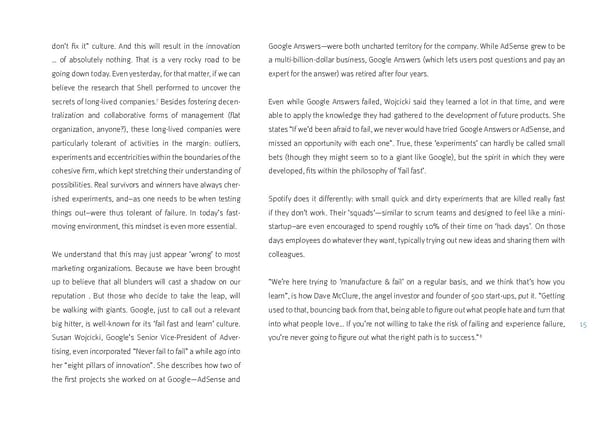don’t fix it” culture. And this will result in the innovation Google Answers—were both uncharted territory for the company. While AdSense grew to be … of absolutely nothing. That is a very rocky road to be a multi-billion-dollar business, Google Answers (which lets users post questions and pay an going down today. Even yesterday, for that matter, if we can expert for the answer) was retired after four years. believe the research that Shell performed to uncover the 7 secrets of long-lived companies. Besides fostering decen- Even while Google Answers failed, Wojcicki said they learned a lot in that time, and were tralization and collaborative forms of management (flat able to apply the knowledge they had gathered to the development of future products. She organization, anyone?), these long-lived companies were states “If we’d been afraid to fail, we never would have tried Google Answers or AdSense, and particularly tolerant of activities in the margin: outliers, missed an opportunity with each one”. True, these ‘experiments’ can hardly be called small experiments and eccentricities within the boundaries of the bets (though they might seem so to a giant like Google), but the spirit in which they were cohesive firm, which kept stretching their understanding of developed, fits within the philosophy of ‘fail fast’. possibilities. Real survivors and winners have always cher- ished experiments, and–as one needs to be when testing Spotify does it differently: with small quick and dirty experiments that are killed really fast things out–were thus tolerant of failure. In today’s fast- if they don’t work. Their ‘squads’—similar to scrum teams and designed to feel like a mini- moving environment, this mindset is even more essential. startup–are even encouraged to spend roughly 10% of their time on ‘hack days’. On those days employees do whatever they want, typically trying out new ideas and sharing them with We understand that this may just appear ‘wrong’ to most colleagues. marketing organizations. Because we have been brought up to believe that all blunders will cast a shadow on our “We’re here trying to ‘manufacture & fail’ on a regular basis, and we think that’s how you reputation . But those who decide to take the leap, will learn”, is how Dave McClure, the angel investor and founder of 500 start-ups, put it. “Getting be walking with giants. Google, just to call out a relevant used to that, bouncing back from that, being able to figure out what people hate and turn that big hitter, is well-known for its ‘fail fast and learn’ culture. into what people love... If you’re not willing to take the risk of failing and experience failure, 15 Susan Wojcicki, Google’s Senior Vice-President of Adver- you’re never going to figure out what the right path is to success.”8 tising, even incorporated “Never fail to fail” a while ago into her “eight pillars of innovation”. She describes how two of the first projects she worked on at Google—AdSense and
 Agile Marketing Manifesto Page 14 Page 16
Agile Marketing Manifesto Page 14 Page 16